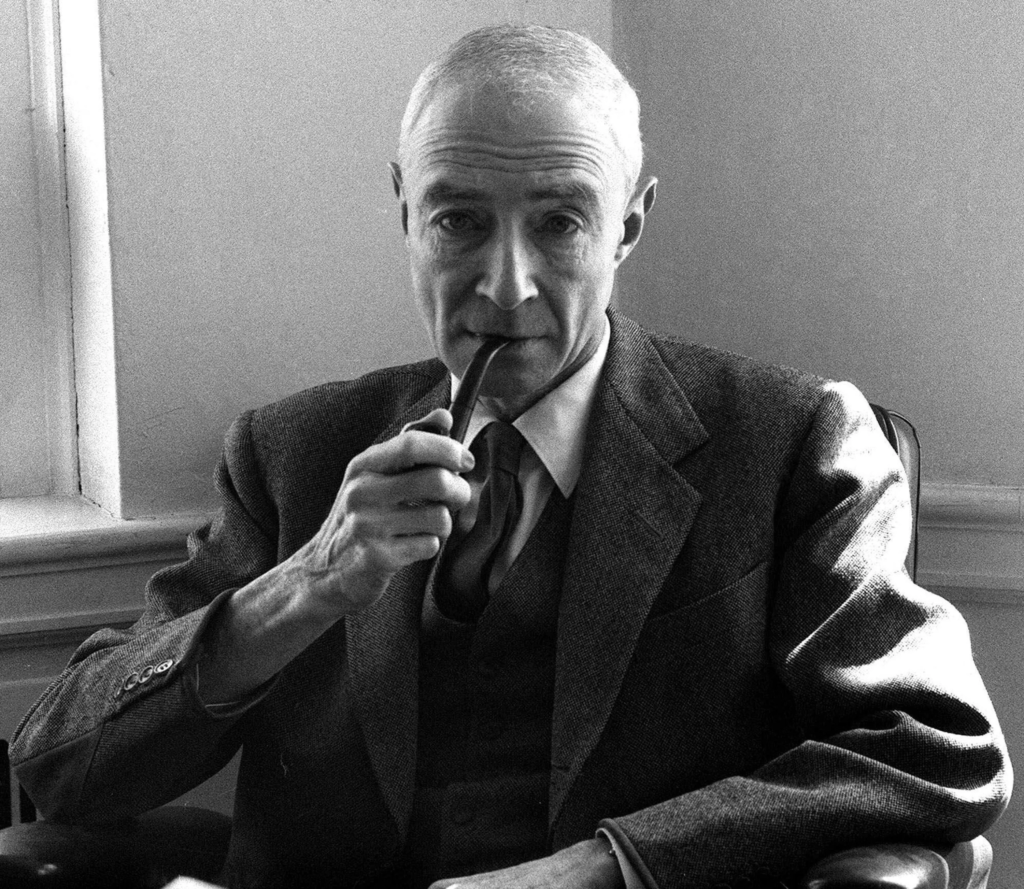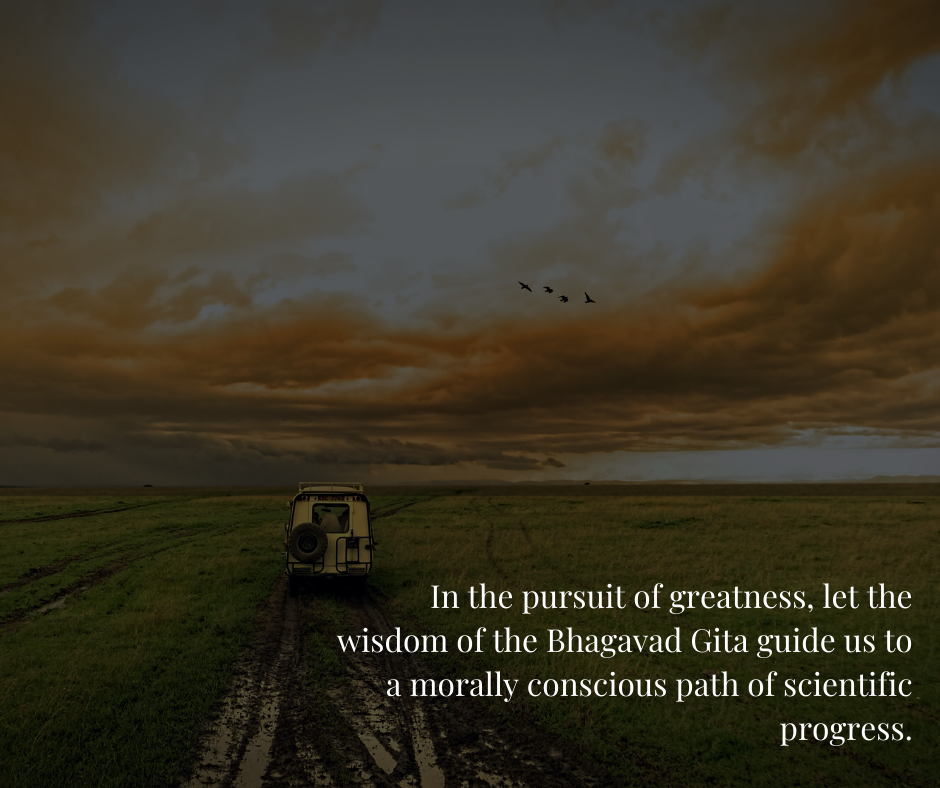The life and legacy of J. Robert Oppenheimer, American theoretical physicist and scientific director of the Manhattan Project during World War II, has been the subject of much debate. Often hailed as the “father of the atomic bomb“, Oppenheimer’s extraordinary contributions to science were overshadowed by the ethical complexities surrounding his involvement in developing nuclear weapons. As we delve into the real story of Oppenheimer, we’ll explore his genius, the ethical dilemmas he faced, and his connection to the timeless wisdom of the Bhagavad Gita.

Early Life and Scientific Career
Born into a privileged family in New York City on April 22, 1904, Oppenheimer displayed prodigious intellectual abilities from an early age. His keen interest in physics led him to pursue higher education at Harvard University, and later, he obtained his “Ph.D.” in physics at the University of Göttingen under the guidance of the distinguished physicist Max Born.
Oppenheimer’s scientific achievements were remarkable, and his work in quantum mechanics and quantum field theory cemented his position as a leading figure in theoretical physics during the 1930s. He eventually secured a faculty position at the University of California, Berkeley, where his talents continued to shine.
Manhattan Project and the Atomic Bomb
The outbreak of World War II created an urgent need to prevent Nazi Germany from developing nuclear weapons. In response, the United States launched the Manhattan Project in 1942, appointing Oppenheimer as its scientific director. The primary objective of the secret project was to develop an atomic bomb before the Axis powers could.
It was during this time that Oppenheimer came across a verse from the ancient Indian scripture Bhagavad Gita, which made a deep impression on him. As the first test of the atomic bomb drew near, he quoted the famous quote from the Gita: “Now I am become Death, the Destroyer Of Worlds“. This moment reflects both his recognition of the bomb’s immense destructive potential and the moral weight he carries as its architect.
Heroic Legacy
Oppenheimer’s leadership and scientific acumen played a key role in the successful development of the atomic bomb. The final use of the bomb in the bombings of Hiroshima and Nagasaki in August 1945 was instrumental in the surrender of Japan, thus ending World War II. Many consider Oppenheimer a hero and credit the creation of the bomb with the timely conclusion of the war, potentially saving millions of lives.
The ethical implications of his deed and the devastating loss of civilian life in Japan cast a shadow over his heroic legacy. The Bhagavad Gita verse he quoted also shows how heavy a burden he as a scientist had taken to bring such a destructive force to the world.
Controversy and Ethical Dilemmas
Despite his wartime achievements, Oppenheimer’s postwar life took a controversial turn. The onset of the Cold War and suspicions of his past association with left-wing intellectuals led to scrutiny of his political beliefs. In 1954, his security clearance was revoked and he faced intense scrutiny, with communist sympathies alleging that his reputation had been tarnished.
In these turbulent times, the teachings of the Bhagavad Gita once again became relevant. The Gita stresses duty without attachment to results, and it is conceivable that Oppenheimer was grappling with the consequences of his scientific advances and the eventual use of the atomic bomb.
Inspiring a Movie
Christopher Nolan‘s 2023 biographical thriller film “Oppenheimer” promises to be an unforgettable cinematic experience. With a perfect blend of visual brilliance, suspense, and thought-provoking themes, the film offers an intimate and intriguing journey into the life and mind of “J. Robert Oppenheimer“. As the film sets out to captivate and challenge audiences, “Oppenheimer” is undoubtedly set to leave an indelible mark on both cinema and the collective imagination.

Summary
The life of “J. Robert Oppenheimer” is a multi-faceted tale, displaying both brilliance and controversy. His scientific contributions undoubtedly shaped history, yet the ethical dilemmas surrounding the development and use of the atomic bomb continue to generate intense debate.
Oppenheimer’s connection to the Bhagavad Gita highlights the eternal conflict between scientific progress and the moral responsibilities that come with it. The ancient wisdom of the Gita serves as a poignant reminder that scientific achievements must be combined with profound ethical considerations.
As we analyze Oppenheimer’s true story, we are urged to consider the broader implications of scientific progress and the enduring importance of moral consciousness in shaping a responsible and compassionate world. Only through such introspection can we hope to strike the delicate balance between scientific progress and the preservation of humanity.
People also ask
Why did Oppenheimer quote the Bhagavad Gita?
The story of Oppenheimer’s infamous quote. The line from the Bhagavad Gita, the Hindu sacred text, has come to define Robert Oppenheimer, but its meaning is far more complex than many people understand.
Did Oppenheimer read the Bhagavad Gita?
Oppenheimer, who is considered the father of the atomic bomb, learned Sanskrit and is said to have been influenced by the Bhagavad Gita. The physicist quoted a verse from the Bhagavad Gita in an interview describing the first explosion of a nuclear weapon on July 16, 1945.
What did Albert Einstein say about Bhagavad Gita?
He said, “When I read Bhagavad-gita everything else seems very unnecessary.”
Does Abdul Kalam read Gita?
The 11th President of India “A.P.J. Abdul Kalam” used to read Bhagavad Gita and chant mantras despite being a Muslim.
What does Bhagavad Gita explain?
In the Bhagavad Gita, Krishna teaches that one can kill only the body; The soul is immortal. At death, the soul is reborn in another body, or, for those who have fully understood the true teachings, it attains release (moksha) or extinction (nirvana) – that is, liberation from the cycle of rebirth.
What does Gita say about life?
Bhagavad Gita encourages us to live life with purity, strength, discipline, honesty, kindness, and integrity. That way, we can find our purpose and live it to the fullest.
Who wrote the Bhagavad Gita first?
Maharishi Vedvyas wrote Shrimad Bhagavadgita. Srimad Bhagavad Gita is also known as Gita. The Mahabharata is told in Sanskrit in this Hindu epic.
Why is Geeta important in our life?
Reading Bhagavad Gita reveals the truth about life to us and frees us from superstition and false beliefs. The knowledge gained from the Bhagavad Gita dispels our doubts and boosts our confidence. The teachings of the Gita tell us to think well before acting.
🍀Support
Please consider following and supporting us by following us on Twitter and subscribing to our YouTube channel. Your support is greatly appreciated and will help us continue creating content for you to enjoy. Thank you in advance for your support!!!




